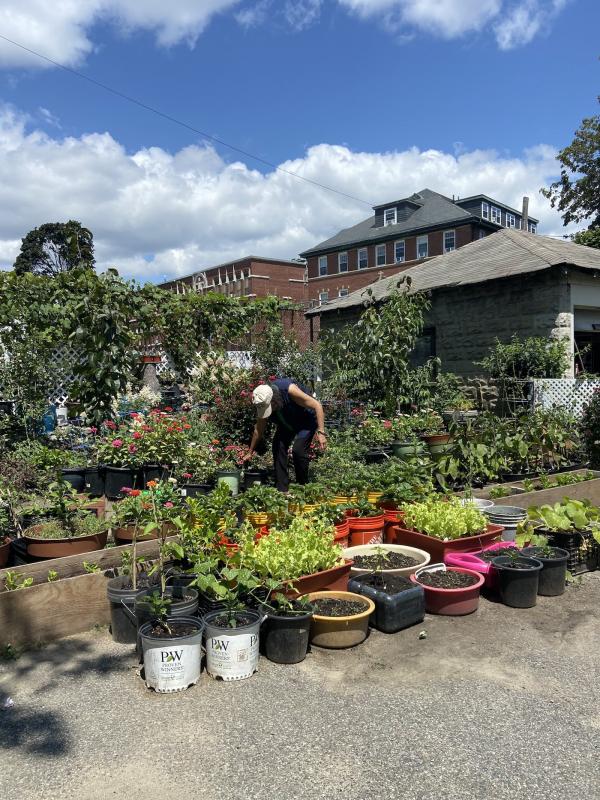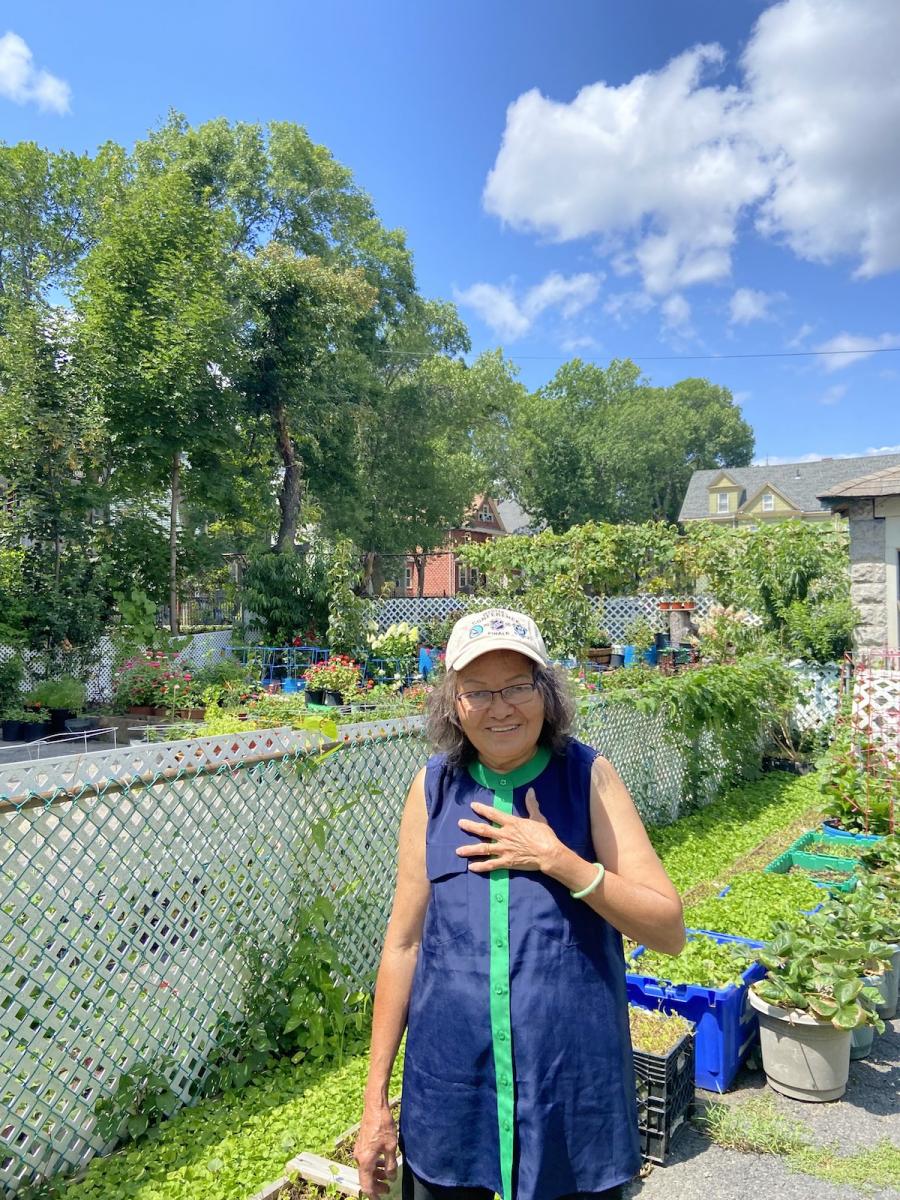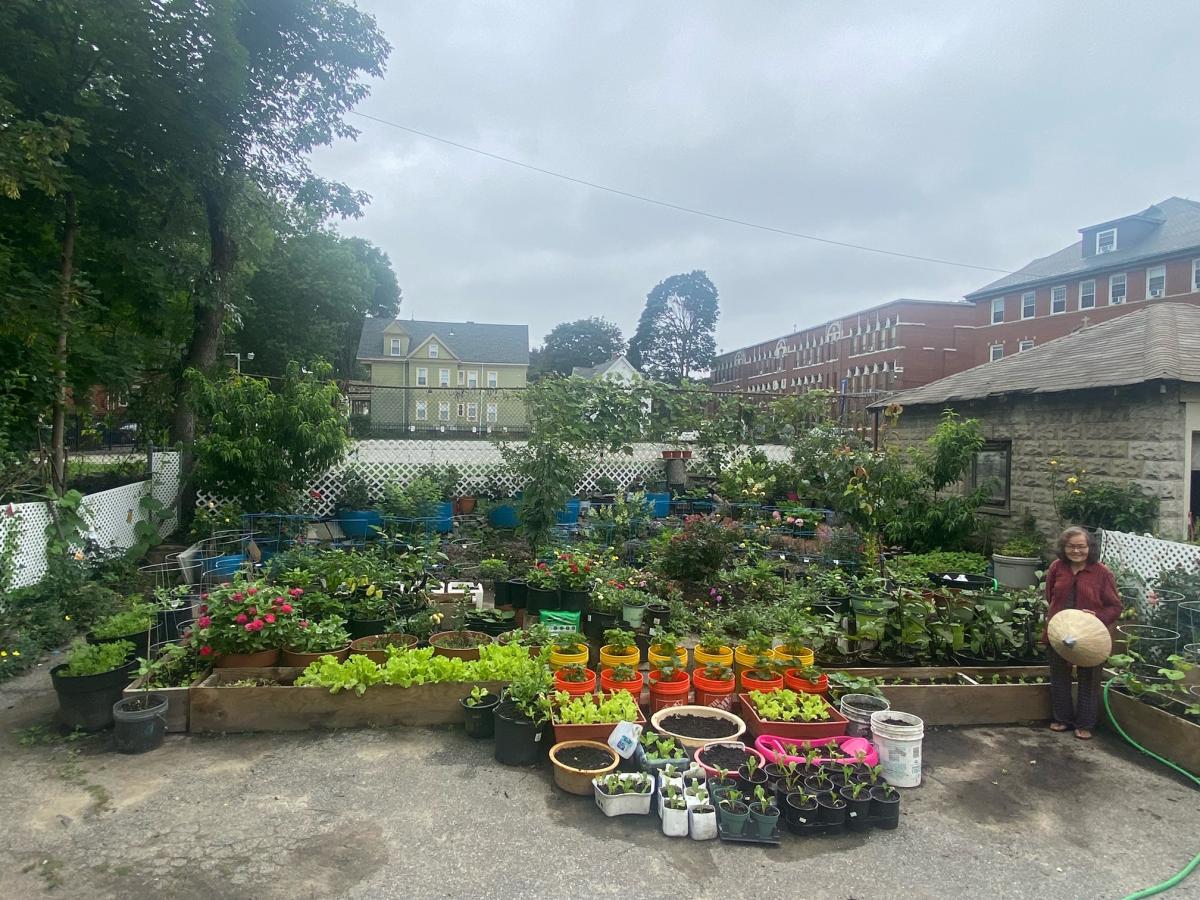August 5, 2021

Tuyet Nguyen, a Vietnamese immigrant and 30-year resident of Dorchester, cultivates a "fusion" garden, planting a mix of Vietnamese herbs, fruits native to the Americas, like blueberries and tomatoes, and flowers. Rebeca Pereira photos
For the third consecutive summer, a row of homes belonging to Vietnamese immigrants on Roseland Street is in bloom. The informal urban garden, home to buzzing pollinators and scallions that reach three feet tall, is restoring collaboration and cultural connection in a small slice of the St. Mark’s Area area, even as its creators continue to work behind masks.
“We’ve been lucky, we haven’t lost anyone to the coronavirus, but that’s only possible because they plant the majority of what we eat,” said Huong Nguyen, whose mother, Tuyet Nguyen, and her cousin, Trong Nguyen, operate the small-scale urban farm out of their backyards, vending their surplus harvest to inquiring neighbors and cooking the rest themselves.
Cradling a shriveled Vietnamese squash in one hand, its growth stunted by July’s persistent rains, Tuyet points to the pair of 50-gallon drum barrels stationed under the shade of her back deck. They’re nearly overflowing with rainwater.
To mitigate waste, the Nguyen cousins collect rainwater for irrigation, meaning that even last month’s thunderous deluge — the second wettest July in the city’s recorded history — had its silver lining.
The green-thumbed septuagenarians aren’t unaccustomed to abundance. On the contrary, they always grow more than they can eat, and the mass appeal of the Vietnamese staples they harvest among their community of expats guarantees that none of their surplus goes to waste.
Pennywort, a leafy South Asian herb proliferated in soil-dense crates, can be juiced for its homeopathic properties. Malabar spinach, or Mong Toi, is commonly used in broth-based soups, as are the Thai chili peppers and bean sprouts that grow alongside them.
In Trong’s backyard, Su-su vines, which blossom and yield an equatorial squash akin to chayote, crawl along a knotted makeshift trellis fashioned out of red plastic ribbons and contorted wire fencing.
In the abutting lot, Tuyet has planted rows of water spinach in two identical bathtubs poached from friends’ home renovations and repurposed for her small farm.

Tuyet Nguyen photo.
Even the low, three-foot fence between the two homes is lined with a sheet of uniform vegetation, the coiled stems of bittermelon bulbs peeking through the diamond-shaped chain links.
“It’s nice because during Covid this gave us something to do to keep ourselves busy and it also brought a sense of community during an isolated time,” said Trong, communicating with interpretation assistance from Huong.
Before immigrating to the United States in 2006 and settling first into his son’s Adams Street home, Trong worked for decades as a field laborer in Vietnam.
The differences between Vietnamese soil and the mixture of soil and manure from Home Depot that he uses now are undeniable, and, over the years, he has devised a number of workarounds, like reusing empty egg crates to support herbs with less durable roots and to prevent soil erosion.
In his retirement years, the garden not only offers Trong a symbiotic connection to his cultural community and some pocket change, but it offers some catharsis after years of sacrifice.
On Roseland Street, where Trong now lives with his daughter, his work has become his leisure time.
“In Vietnam, he grew these plants and these vegetables himself, but, when he moved here, he noticed the ground just wasn’t conducive to the same kinds of vegetables he was used to cultivating at home and the ones he was interested in continuing to cultivate himself because they’re very hard to find, or could be very hard to find,” said Huong.
“He started collecting these pots and crates to plant the food he knew, the food he wanted to eat, and that’s essentially how it started,” she added. She is herself a Vietnamese refugee, having fled after her father’s imprisonment during the Vietnam War.
A Boston Latin graduate, she has lived in this corner of Dorchester a block from the Shawmut MBTA station with her mother for more than 30 years. The bumper of her black Toyota Corolla parked out front leaves reads: “I love Dot.”
“Obviously, there’s an older generation that holds on more strongly to Vietnam because they have stronger memories of home there, but they’ve still managed to create a community and a home here, too,” said Huong. “It’s like they’re creating belonging with food, and I think that’s just so cool and should be celebrated.”

Tuyet Nguyen at the edge of her backyard garden on Roseland Street in Dorchester. In the background are the former St. Mark’s Convent and Grammar School. Rebeca Pereira photos



